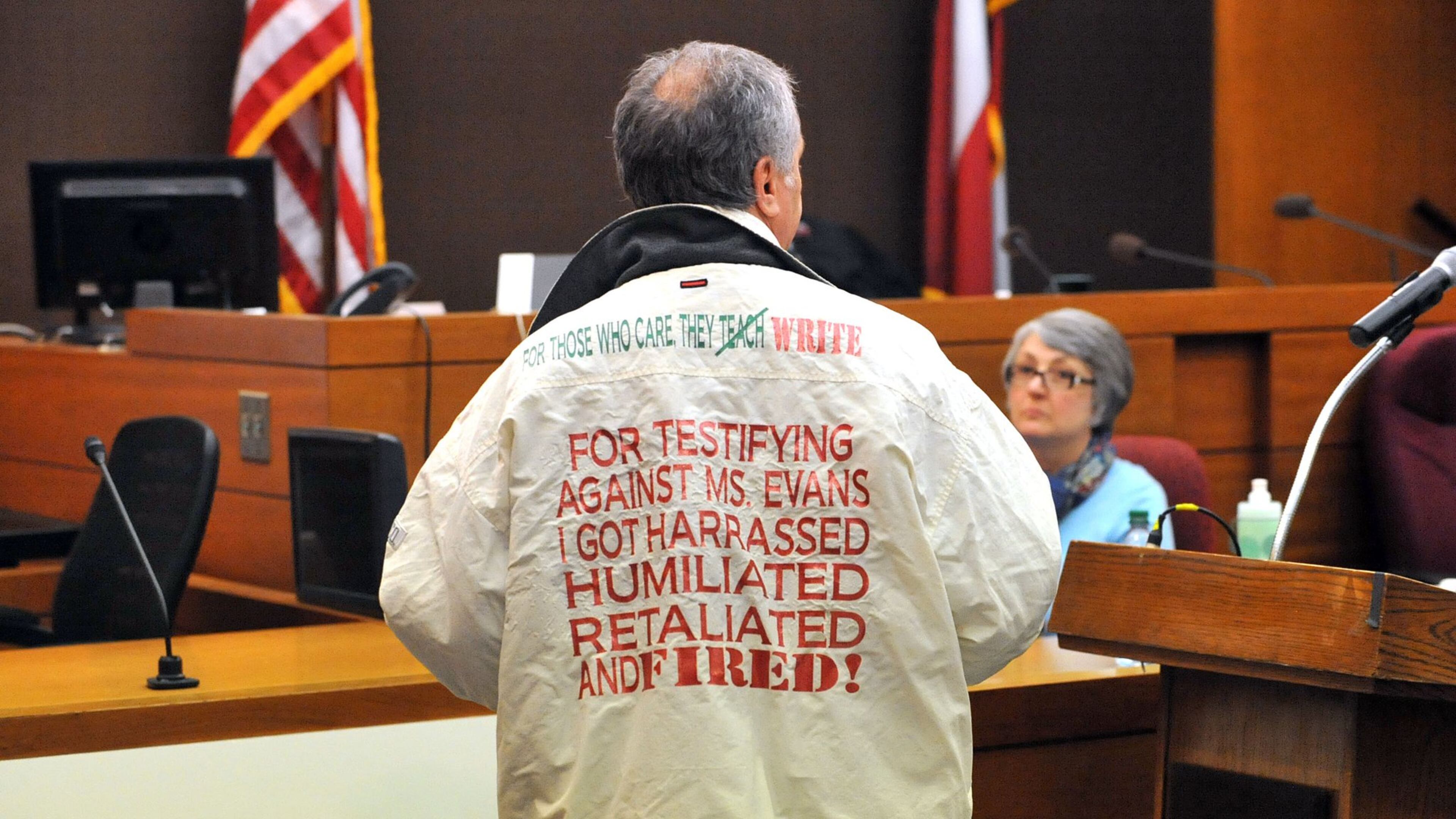APS trial’s closing arguments: Liars and cheaters to bear, oh my

The 12 defendants in the Atlanta Public Schools trial are all liars and cheats, Fulton County prosecutors argued Monday as closing statements began in the months-long courtroom drama.
Actually, the real liars and cheats are the witnesses who testified for the prosecution, countered defense attorneys for two of the defendants.
The APS test-cheating trial resumed Monday in Fulton County Superior Court following a spring break of more than two weeks. Judge Jerry Baxter said closing arguments most likely will end Wednesday, after which jurors will start deliberating. The trial started in August with a jury-selection process that lasted six weeks, and testimony began in late September.
The defendants stand accused of conspiring to erase and correct students’ answers on the 2009 Criterion-Referenced Competency Tests in order to inflate scores.
“They cheated. They lied. And they stole,” said Fulton County prosecutor Clint Rucker.
The former educators’ alleged goal? To ensure that troubled schools in low-income areas would meet federal mandates. Teachers, principals and even janitors were rewarded with bonuses, and in some cases promotions, when the schools succeeded. Because the false scores masked learning deficits, affected schools lost out on millions of federal dollars available to provide tutoring to students struggling in reading and math.
All 12 defendants are charged with violating the state Racketeer Influenced and Corrupt Organizations Act, commonly called RICO. The racketeering charge carries a 20-year prison sentence. But each defendant is also charged with lesser felonies — such as tampering with a witness and theft by taking — that allow for significant prison time too.
All 12 defendants maintain they are innocent.
Attorneys for former Dobbs Elementary School principal Dana Evans and former Dunbar Elementary School teacher Diane Buckner-Webb tried to undermine the prosecution’s case by arguing that, indeed, there had been lying. But the defense contended it was done by the prosecution’s witnesses, many of whom had pleaded guilty or received immunity for their testimony.
“These witnesses aren’t worth a crap,” said Bob Rubin, who represents Evans.
“This is a garbage case,” said Keith Adams, who represents Buckner-Webb. “No one should be convicted based on testimony from a lying witness.”
Thirty-five people were indicted two years ago following an investigation kicked off by investigative reports in The Atlanta Journal-Constitution about unrealistic improvements in CRCT scores. Twenty-one of those educators pleaded guilty to lesser charges, and two others died of cancer before trial. Former D.H. Stanton principal Willie Davenport died in September 2013. And former Superintendent Beverly Hall, whose trial was delayed because she had breast cancer, died two weeks ago.
RICO requires prosecutors to prove defendants knew what they were doing when they joined a conspiracy with at least two members who shared a common plan.
Prosecutor John Floyd told jurors that the overt acts could have been committed by different co-defendants, and that the co-defendants didn’t have to know each other to be part of the conspiracy.
The defense said that was ridiculous.
“It makes no sense,” Adams said, disagreeing with Floyd’s explanation of RICO.
Rubin said there was no evidence that his client, former Dobbs Elementary principal Evans, conspired to change answers on the 2009 CRCT or to help students find the correct answer as they were taking the test. Prosecutors said 256,779 wrong-to-right changes were made to the test given at APS schools that year.
“Who did she conspire with?” Rubin asked, noting that Dobbs met its targets in 2008, but not in 2009, the year that was the trial’s focus. “There’s no evidence of that. There isn’t an email. There isn’t a letter.”
Before jurors came in Monday morning, the judge threw out a count each in the 29-count indictment against two of the defendants, former Benteen Elementary School testing coordinator Theresia Copeland and former regional director Sharon Davis Williams.
On Tuesday, jurors will hear from most of the remaining defense lawyers, each for an hour. Then prosecutors will use what remains of their allotted five hours.

